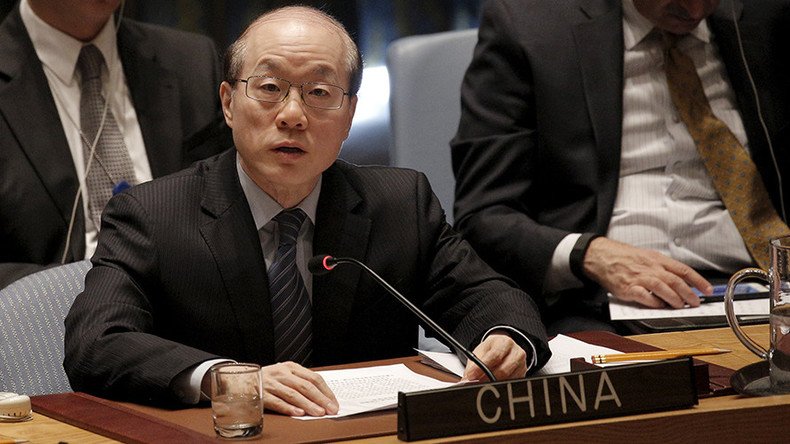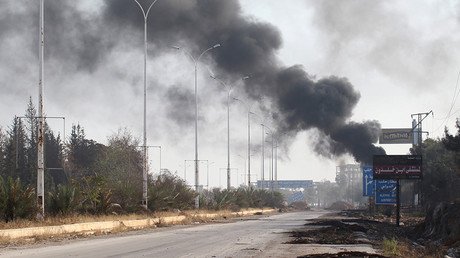‘Aleppo ceasefire resolution would only benefit jihadists’

The idea of an Aleppo resolution in which the international community led by the United Nations would provide humanitarian aid, may look nice on paper. However, only jihadists would benefit from it, military and political analysts told RT.
A draft resolution was submitted by Egypt, Spain and New Zealand to the UN Security Council (UNSC) on Monday, proposing an initial ceasefire period of seven days, to allow for the delivery of humanitarian cargo and to pave the way for the resumption of settlement talks.
Venezuela voted against the resolution while Angola abstained and 11 members of the UNSC voted in favor of it.
Russia and China vetoed the resolution as a “counterproductive” measure unlikely to produce any “tangible results.”
“It was done by the Egyptians and a few other countries to push for a ceasefire. But it is very clear that the ceasefires, the previous ceasefires had been used for the jihadists, the so-called moderates … to rearm and to try to regain field advantage,” Michael Maloof, a former Pentagon official, told RT.
“That’s precisely what they did the last time, when there was a ceasefire. The one negotiated by Russia and the United States, and it only lasted for two days.”
The previous ceasefire agreements fell flat, as “jihadists have no intention of standing down even if they are ordered by the United States or anybody else and they are spurred on by the people who [are] arming them, primarily by [the] Saudis and the Qataris,” according to Maloof.
“There are just terrorists out there and Mr. Lavrov is absolutely correct in saying that they are just going to take advantage of it. And they also said that if the Trump administration doesn’t arm them, they are going to join [Al-]Nusra,” said Maloof.
”We have Ahrar as-Sham, for example, one of the so-called moderates, that the United States is helping to fund indirectly and provide arms to indirectly through Saudi Arabia and Qatar. They conducted operations with [Al-]Nusra already in the past. Their goal is to defeat Bashar Assad, it’s not to go after ISIS, they have no intention of moderating. They’ve already declared that they want to set up their own caliphate.”
China’s veto is not a surprise, Maloof added, since “China has a stake in the outcome of this, because they don’t want jihadists running around either. They have their own jihadi problem in western part of China, Xinjiang province. The Chinese are clearly showing support for the Russian and Iranian position to safeguard the government of Syria against the jihadists.“
While “it’s very popular to propose a resolution where the international community, led by the United Nations will provide humanitarian aid to the place ... it’s also very understandable why the Russians would not want to do that,” Max Abrahms, a political scientist from Northeastern University told RT.
“The rebels in Aleppo are on the course of losing. And there’s a very real fear if there’s a cessation of violence, cessation of hostilities for seven days, the rebels will be able to reequip themselves, rearm themselves and that will thereby prolong the conflict.”
The resolution draft was more of a publicity stunt, Richard Becker of the Answer Coalition told RT. Some “strong language inside the Security Council” was the only possible outcome of the proposition, since “everyone knew what was going to happen, that it was going to be vetoed by Russia and China.”
Some real results can be expected from the upcoming direct Russia-US negotiations in Geneva, though they can stall over the issue of separating “moderate” militants from not-so moderate ones.
“The discussion of getting Al-Nusra Front separated from so-called moderate rebels has been going on for a very long time. And it appears to be going absolutely nowhere,” said Becker.
“The armed opposition within Eastern Aleppo I don’t think has a chance without its relationship, without its alliance with Nusra and others. And other groups said they are not going anywhere, they are going to fight to the last drop of blood. People often proclaim things like that, when they are in battles and situation on the ground changes. But the idea, that somehow Al-Nusra would be separated from the so-called moderates has been proven over and over again to be just an illusion.”
The statements, views and opinions expressed in this column are solely those of the author and do not necessarily represent those of RT.













